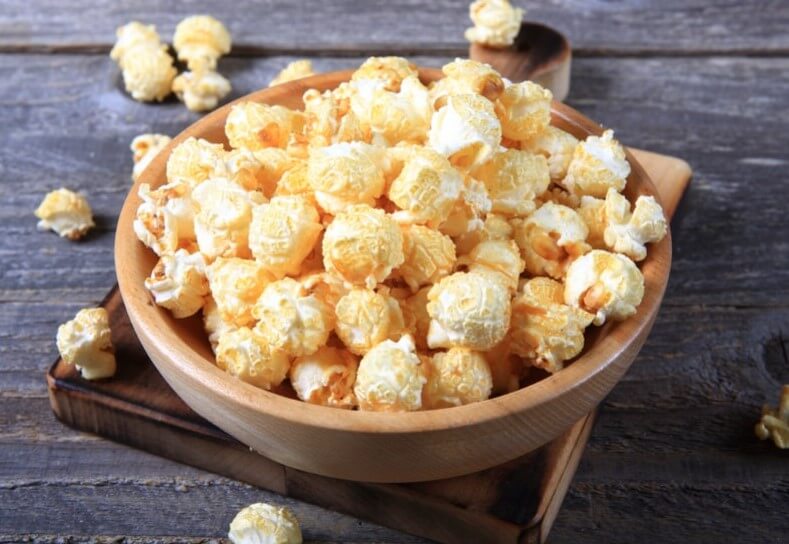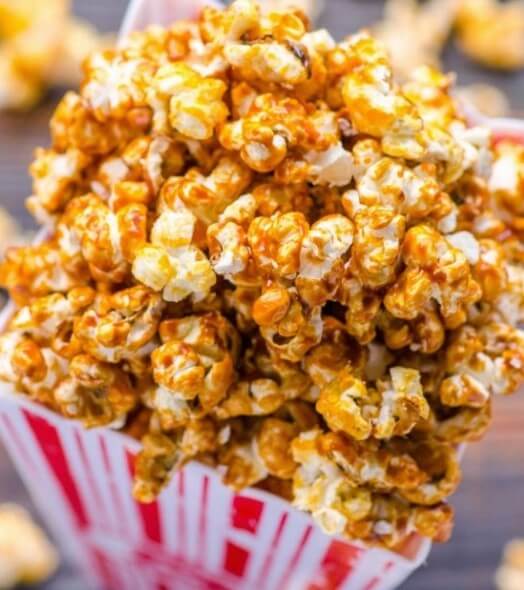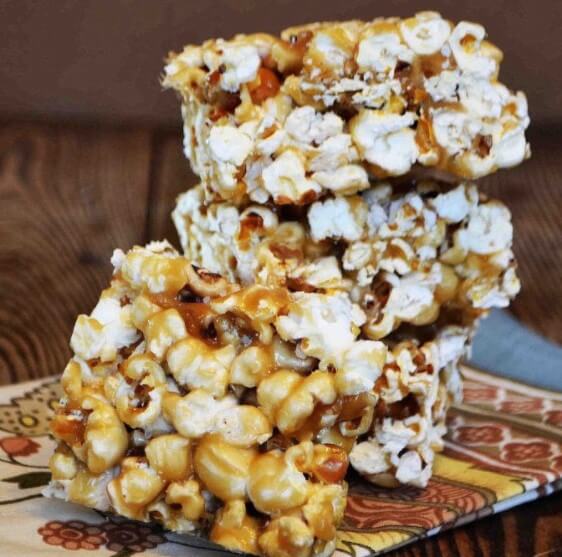nutritional facts about popcorn! news about the antioxidant value of popcorn, very rich in polyphenols, transmitted by the American Chemical Society, suggests that it is a rich, crunchy and healthy snack. However, its nutritious and healthy foundation changes depending on the type of popcorn (plain grain or commercial for microwave) and the seasonings it is made. Using more oil than necessary to sauté them in the pan, using butter instead of oil to achieve more flavor, being generous with the salt or adding sugar or honey to give them the sweet counterpoint are gestures that condition and undermine the healthy nutritional contribution of this appetizer.
- Popcorn: healthy snack with nuances
- In the pan or in the microwave?
- General information
- Nutritional Chart: Popcorn
- Nutrients
- Energy
- Carbohydrates
- Sugar
- Fiber
- Sodium
- Water
- Protein
- Featured Vitamins
- Vitamin A
- Vitamin B-9
- Featured minerals
- Calcium
- Potassium
- Magnesium
- Match
- Sodium
- Selenium
- How many calories does it have?
- Calories
- Fat and Cholesterol
- Total Fat
- Cholesterol
- Popcorn – Nutrition Facts
Popcorn: healthy snack with nuances

Popcorn is made from a special variety of corn that explodes into popcorn when heated to high temperatures. As a food, 100 grams of popcorn provides a modest amount of calories (370 Kcal / 100 g), which is why it is considered a good but energetic snack and, therefore, of moderate consumption.
In terms of nutrients, and in that amount, popcorn contains carbohydrates (60 grams) and proteins (10 grams), minerals (phosphorus, magnesium, potassium and more sodium the more salt is added as a seasoning) and vitamins (group B). One aspect highlighted by the latest research on this snack is its contribution of polyphenols which, together with its net carotenoid content, make it a snack that provides a good dose of antioxidants.
Don’t miss:honey pop corn
The amount of fat in popcorn varies a lot , from just 4 g / 100 g if cooked without oil (or with a pinch), up to 8 times more (30.2 g / 100 g) if a lot of fat is added ( oil or butter) in its preparation or if commercial popcorn is chosen for microwave cooking. Popcorn does not add any cholesterol, unless butter is used to cook it.
Since their energy value is not negligible, they should be consumed in moderation, particularly in the case of overweight and obesity. The difficulty for many people is that they are tempted, which leads them to eat more than a healthy portion would be. An added advantage of popcorn compared to other appetizers and snacks is that they are gluten-free, so their consumption is suitable for those with celiac disease or gluten intolerance.
In the pan or in the microwave?

The microwave popcorn sold packaged and ready for cooking on the package itself is saltier and, as brands contain little healthy fat. The ingredients of this popcorn are corn, fat, salt and, in most cases, antioxidant additives. The type of fat that they have added, even if it is vegetable, is not always healthy.
The healthy and natural thing is to eat homemade popcorn from loose grains, natural and in the pan
Some contain palm oil, which makes the snack rich in saturated fat and therefore unhealthy. In other cases, they add a fat even more harmful to health, partially hydrogenated vegetable oils ( trans fats ).
The type and amount of fat and salt in these commercial popcorn makes the difference between a healthy snack and a non-recommended one. In fact, one hundred grams of salted microwave popcorn provides about 500 calories (more than 100 Kcal more than if made in the pan) and its fat content goes from 4% that the corn kernel had to between 20% and 32% when cooked and consumed in this format. The salt content of the cooked product is high, between 1.3% and 2.6%, depending on the brand.
To make popcorn a healthy snack, the ideal thing is to make it homemade: add the corn kernels to a very hot pan and spread with a few drops of olive oil. It is advisable to move the pan continuously so that the grains do not burn. As soon as they begin to explode, the temperature is lowered and the movement of the pan is maintained until cooking is complete. You just need to add a pinch of salt to make them tastier.
General information

Popcorn, millet, popcorn, pochoclos, pururú, pop, canchita, canguil, pororó, popcorn, gallitos, poporopos, popcorn, pyre corn, chivitas, goats of corn, tote corn, pipocas, rosettes, roses, threads , tostones, cocaleca, or flowers are an aperitif made from some special varieties of corn.
For its preparation, corn grains of a special type are used, which are arranged in a pot or container and roasted (usually by frying them in vegetable oil) until exploding. Only a few varieties of corn (one of them, called popcorn or the variety Zea mays everata Sturt) produce the desired result, which is the sudden expansion of the grain content resulting in the sudden rupture of the shell, and the formation of a mass fluffy white; phenomenon that is mainly due to overheating of internal humidity.
Consumed with salt and butter dressing, or caramelized, this popular treat is especially favored by moviegoers, and widely available in theaters around the world.
Nutritional Chart: Popcorn
- 100 grams of Popcorn contain 90.1 grams of carbohydrates, 2.5 grams of fiber, 2.00 grams of protein, 286 milligrams of sodium, and 6.00 grams of water
- Popcorn has 0 milligrams of Cholesterol and 1.40 grams of fat.
- 100 grams of Popcorn contains 381 calories, 19% of your total daily needs.
- It also contains some important vitamins that you can see here: Vitamin A (33 mg) or Vitamin B-9 (4 mg).
| Composition | Quantity (gr) | CDR (%) |
|---|---|---|
| Kcalories | 494 | 25.8% |
| Carbohydrates | 44.27 | 14.2% |
| Protein | 6.2 | 13% |
| Fiber | 10 | 33.3% |
| Fats | 30.2 | 56.8% |
| Minerals | Amount (mg) | CDR (%) |
|---|---|---|
| Sodium | 4 | 0.3% |
| Calcium | 10 | 0.8% |
| Iron | 1.1 | 13.8% |
| Magnesium | 0 | 0% |
| Match | 170 | 24.3% |
| Potassium | 220 | eleven% |
| Vitamins | Amount (mg) | CDR (%) |
|---|---|---|
| Vitamin A | 0.02 | 2.2% |
| Vitamin B1 | 0.18 | fifteen% |
| Vitamin B2 | 0.11 | 8.5% |
| Vitamin B3 | 1.7 | 0% |
| B12 vitamin | 0 | 0% |
| Vitamin C | 0 | 0% |
Nutrients
Energy
381 kcalWe need an average of 2000 calories per day. 100 grams of Popcorn have 381 calories, the 19% of your total daily calorie needs.
Carbohydrates
90.1 gr100 grams of Popcorn contain the 30% of your total daily needs: 90.1 grams of carbohydrates.
Sugar
64.68 mg100 grams of Popcorn contain 64.68 grams of sugars.
Fiber
2.5 g100 grams of Popcorn contain 2.5 grams of dietary fiber, the 8% of your total daily needs.
Sodium
286 mg100 grams of Popcorn contain the 19% of your total daily needs: 286 milligrams of Sodium.
Water
6.00 g100 grams of Popcorn contain 6% of water, 6.00 grams.
Protein
2.00 g100 grams of Popcorn contain the 4% of your total daily needs: 2.00 grams of protein.Normal ValueValue CautionDangerous Value
Featured Vitamins
People with low levels of vitamin in the diet can suffer from deficiency diseases. Vitamins are really important substances for body health. For this reason we recommend that you maintain a balanced intake of vitamins.
Vitamin A (33 mg) and Vitamin B-9 (4 mg) are some of the vitamins in Popcorn.
Vitamin A
33 UIVitamin A is required for many vital bodily functions, to function as an antioxidant, and to improve skin health, bone metabolism, embryonic development, good vision, and gene transcription and reproduction. In 100 grams of Popcorn, you can find 33 IU of Vitamin A. It provides 1% of the recommended daily value for the average adult.
Vitamin B-9
4 µgFolic acid (Vitamin B9) is essential for the proper functioning of the body and a healthy life. It plays an important role in the healthy maintenance of the digestive system, hair, skin, joints and eyes. 100 grams of Popcorn contains 4 micrograms of Vitamin B-9, 1% of the recommended daily value for an adult.Normal ValueValue CautionDangerous Value
Featured minerals

There are two types of minerals that your body needs: macrominerals and micro-minerals. Your body needs large amounts of macrominerals rather than trace minerals. The prominent or main macrominerals are Sodium, Potassium, Calcium or Magnesium. Trace minerals or microminerals are made of iron, manganese, copper, iodine, zinc, cobalt, fluorine, and selenium.
Selenium (3.6 mg), Sodium (286 mg) and Potassium (110 mg) are some of the minerals present in Popcorn.
Calcium
18 mgCalcium is not only known to harden bones, teeth and the heart. It is also considered a very important mineral in human metabolism, making up about 2% of the weight of a human adult. 18 milligrams of calcium can be found on every 100 grams of Popcorn, the 2% of the daily recommended calcium intake.
Potassium
110 mgPotassium has a role both at the cellular and electrical level. This mineral is an essential element for the activation of an important enzyme in carbohydrate metabolism. In 100 grams of Popcorn, you can find 110 milligrams of potassium. Provides 2% of the recommended daily value for the average adult.
Magnesium
27 mgMagnesium is a vital mineral that has shown its positive impact on energy production, regulation of the immune system, and muscle function. It also helps in the production of protein and the regulation of glucose levels. 100 grams of Popcorn contains 27 milligrams of magnesium, 7% of the recommended daily for one person.
Match
55 mgPhosphorus has a good relationship with the production of calcium in the bones – it provides hardness to bones and teeth. Your body needs the right amount of both for strength. However the most important factor is the balance between the two elements. 100 grams of Popcorn contains 55 milligrams of Phosphorus, 6% of the daily recommended value for one person.
Sodium
286 mgSodium works closely in conjunction with chlorine and potassium to ensure proper electrolyte fluidity or pH balance in your body. Sodium also plays a special role in helping with nerve transmission, muscle contractions, and hydration. In 100 grams of Popcorn, you can find 286 milligrams of sodium. Provides 19% of the daily recommended value for the average adult.
Selenium
3.6 µgSelenium is found naturally in many foods. According to studies, these enzymes play a role in thyroid and immune functions. It also helps regulate female fertility and protects from antiviral effects. 100 grams of Popcorn contains 3.6 micrograms of selenium, 5% of the recommended daily value for an adult.Normal ValueValue CautionDangerous Value
How many calories does it have?

You need an average of 2,000 calories a day to maintain bodily functions. 100 grams of Popcorn have 381 calories, the 19% of your total calorie needs.
Calories
381 KcalThere are 3 different levels of physical activity to calculate the average intake of Kcal per day.
A moderately active woman between the ages of 12 and 25 needs between 2,000 and 2,200 calories a day, while a woman between 26 and 50 needs 2,000 calories, and those between 51 and 76 years of age need between 1,600 and 1,800.
Fat and Cholesterol
Total Fat
1.40 g100 grams of Popcorn contain 1.40 grams of total fat, of which 0.20 gr. they are saturated.
An average adult needs 65 grams of total fat per day. 65 grams of fat is equivalent to 30% of the calories consumed by humans and represents the estimated amount necessary for a 133-lb person to maintain their weight. For a 167-lb person the estimated daily need is 80 grams of fat.
Cholesterol
0 mgThe AHA (American Heart Association) recommends limiting your daily cholesterol intake to less than 300 milligrams. Less than 200 if you are at high risk for heart disease.
Popcorn – Nutrition Facts
| per 100gr | Daily value | |
|---|---|---|
| NUTRIENTS | ||
| Energy | 381 kcal | 19% |
| Total Fat | 1.40 g | two % |
| Carbohydrates | 90.1 gr | 30% |
| Cholesterol | 0 mg | 0% |
| Sodium | 286 mg | 19% |
| Water | 6.00 mg | 6% |
| Protein | 2.00 g | 4 % |
| Vitamins | ||
| Vitamin A | 33 UI | one % |
| Vitamin B-6 | – | – |
| B12 vitamin | – | – |
| Vitamin C | – | – |
| Vitamin D | – | – |
| Vitamin E | – | – |
| Vitamin K | – | – |
| Vitamin B-1 | – | – |
| Vitamin B-2 | – | – |
| Vitamin B-3 | – | – |
| Vitamin B-5 | – | – |
| Vitamin B-9 | 4 mg | one % |
| MINERALS | ||
| Calcium | 18 mg | two % |
| Iron | – | – |
| Potassium | 110 mg | two % |
| Match | 55 mg | 6% |
| Sodium | 286 mg | 19% |
| Zinc | – | – |
| Copper | – | – |
| Fluorine | – | – |
| Manganese | – | – |
| Selenium | 3.6 µg | 5 % |

